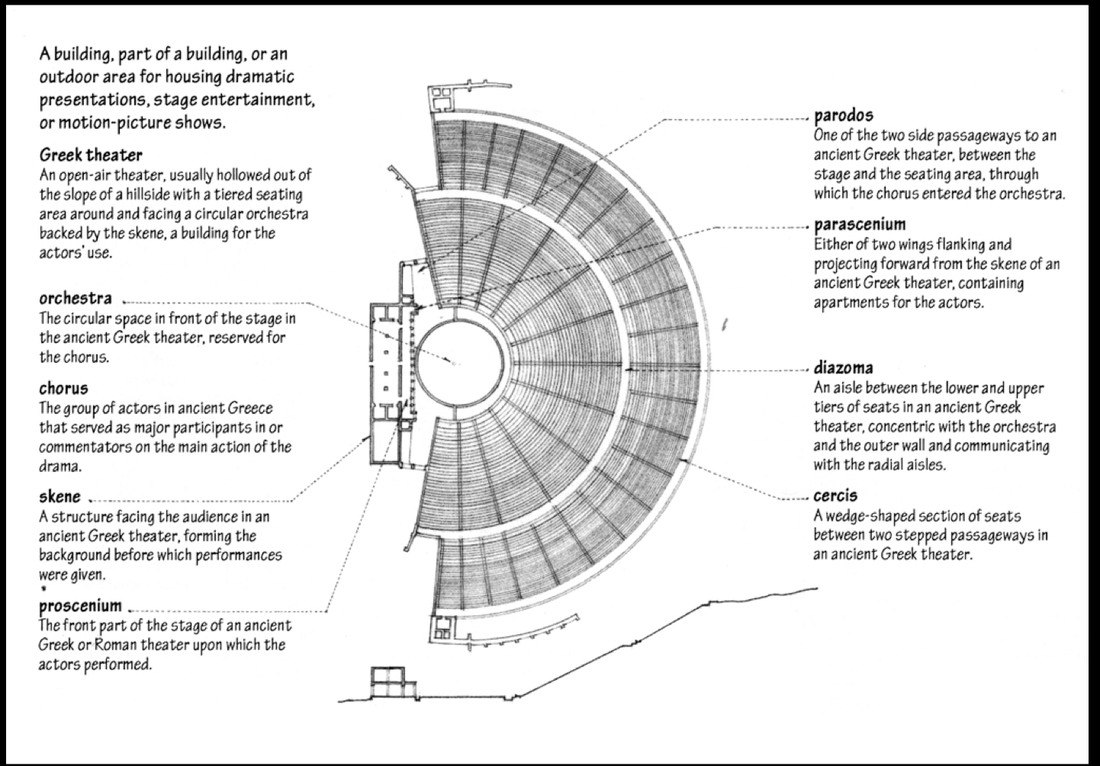Why do we make theatre?
Enduring Understanding: Theatre has been asking the question, “Why?” since its inception. From the first dance dramas in prehistoric times to today, we ask the human question of “Why?” through art. In this case, we are looking at the history of humans asking it through theatrical art. In particular, we will look at Ancient Greece, where western theatre started. You will come to understand that theatre has its roots deeply embedded in the traditions of our culture.
Essential Questions: Why do we make theatre? What pieces of your life drive you to want to create theatre? What do you think is the purpose of theatre in a society?
Students will know:
Theatre history of ancient Greece theatre
Western traditions of theatre
How and why we ask questions about humanity through theatre
How to start exploring their own questions through theatre
Students will be able to:
Identify different types of Greek theatre
Write a basic monologue
Reflect upon performances with knowledge of different theatrical traditions
Assessments:
Activity 1: Discuss as a group different eras and culture’s representation of theatre in the pursuit of defining the human condition.
Activity 2: Play “Theatrical Pictionary” with theatrical traditions. In teams, the class will attempt to identify different theatrical traditions through basic drawings that relay the visual concepts of each theatrical tradition.
Activity 3: Individually students will answer questions on the video about Greek theatre located at the bottom of this page https://www.youtube.com/watch?v=FqnBBjC_8no#t=227.214142231
Activity 4: Using the knowledge of theatrical history of ancient Greece, students will develop a 30 second – one minute monologue. This monologue will represent a single question in the student’s life that needs definition.
Content Standards:
TH:Cr2.1.HSI
a. Explore the function of history and culture in the development of a dramatic concept through a critical analysis of original ideas in a drama/theatre work.
TH:Re8.1.HSI
b. Identify and compare cultural perspectives and contexts that may influence the evaluation of a drama/theatre work.
TH:Re9.1.HSI
a. Examine a drama/ theatre work using supporting evidence and criteria, while considering art forms, history, culture, and other disciplines.
TH:Cn11.1.HSI
a. Explore how cultural, global, and historic belief systems affect creative choices in a drama/theatre work.
Essential Questions: Why do we make theatre? What pieces of your life drive you to want to create theatre? What do you think is the purpose of theatre in a society?
Students will know:
Theatre history of ancient Greece theatre
Western traditions of theatre
How and why we ask questions about humanity through theatre
How to start exploring their own questions through theatre
Students will be able to:
Identify different types of Greek theatre
Write a basic monologue
Reflect upon performances with knowledge of different theatrical traditions
Assessments:
- Class participation in discussion
- Class participation in critique
- Identifying sections of theatrical history through group projects
- Developing a monologue that reflects their own quest for the answer to “Why?”
Activity 1: Discuss as a group different eras and culture’s representation of theatre in the pursuit of defining the human condition.
Activity 2: Play “Theatrical Pictionary” with theatrical traditions. In teams, the class will attempt to identify different theatrical traditions through basic drawings that relay the visual concepts of each theatrical tradition.
Activity 3: Individually students will answer questions on the video about Greek theatre located at the bottom of this page https://www.youtube.com/watch?v=FqnBBjC_8no#t=227.214142231
Activity 4: Using the knowledge of theatrical history of ancient Greece, students will develop a 30 second – one minute monologue. This monologue will represent a single question in the student’s life that needs definition.
Content Standards:
TH:Cr2.1.HSI
a. Explore the function of history and culture in the development of a dramatic concept through a critical analysis of original ideas in a drama/theatre work.
TH:Re8.1.HSI
b. Identify and compare cultural perspectives and contexts that may influence the evaluation of a drama/theatre work.
TH:Re9.1.HSI
a. Examine a drama/ theatre work using supporting evidence and criteria, while considering art forms, history, culture, and other disciplines.
TH:Cn11.1.HSI
a. Explore how cultural, global, and historic belief systems affect creative choices in a drama/theatre work.
above Image from keyword basket.com
|
|
|

